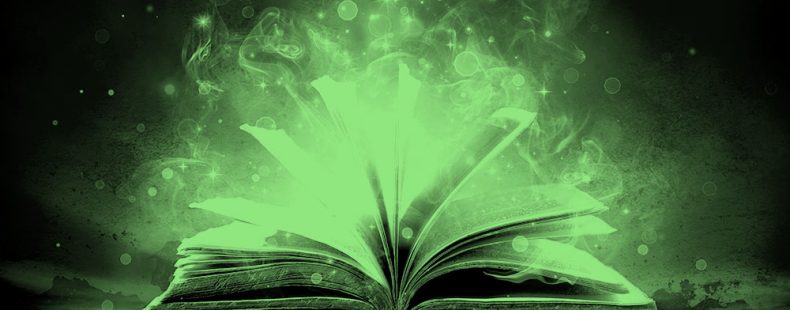Hocus pocus, abracadabra, alakazam! These are the words we invoke when magic is at work—even if it might just be a card trick at home. While a few of these words and phrases have wholly crossed over into entertainment magic or originated there from the start (e.g., presto change-o), some of these words are rooted in older commands that called upon higher powers to influence the material world.
Whether called hexes, hymns, prayers, or simply spells, the words we invoke to communicate with a greater power to work our will all require an intangible force that can be universally described as magic. Take a look and decide for yourself if magic is real or if it’s just a bunch of hocus-pocus.
🪄 A magical quiz
If you’re a real “wiz” at card tricks or have a deeper fascination with charms and spells, you might already know the words on this list. When you’re ready, you can demonstrate your knowledge of magic words by taking this short quiz!
abracadabra
Perhaps one of the oldest and most recognized magical phrases, abracadabra has been around since the second century BCE and has famously appeared in the Harry Potter series. Its origins are contested as scholars posit that abracadabra emerged from Late Latin or Late Greek, reflecting the recitation of the initial letters of the alphabet (abecedary); others hypothesize that it could related to the Hebrew Ha brakha dabra, which translates as, “The blessing has spoken.” We do understand it as a word generally meant to invoke magical power. Abracadabra is classified as a reductive spell, which means it would have been written out as a complete word on the first line, then with one letter missing on the next, then another letter removed on the following line, and so forth. The idea behind reductive spells is that by making the word shorter so would a pain or illness gradually diminish.
Recorded in English in the late 1600s, abracadabra is used in incantations, particularly as a magical means of warding off misfortune, harm, or illness, and for some, is used as a nonsense word, implying gibberish in place of supposedly magical words.
alakazam
Often used as the finale word in the presentation of a grand stage illusion, alakazam is intoned as a powerful command.
While the origins of the word are unknown, according to Magic Words: A Dictionary, alakazam may have ties to a similar-sounding Arabic phrase, Al Qasam, which means “oath.” Therefore, a conjuror invoking alakazam may be calling back to a promise made by a superior being to help complete the miraculous feat they are presenting.
One of the earliest printings of alakazam in an English text is the poem “Among the White Tents,” first published in the Chicago Herald Tribune in 1888. While the poem uses alakazam in the context of entertainment and as an excited expression (“We’re goin’ to de cirkis! / Alakazam!”) there is oddly no connection to magic.
hocus-pocus
Immortalized in a ’90s cult classic family film, hocus pocus may be both invoked as an incantation and might also be used to refer to an act of trickery. For instance, one who is dismissive of fortunetelling might call the act of reading tarot cards “a bunch of hocus pocus.”
First recorded in the 1660s, hocus pocus is likely a corruption of the Latin phrase used in Catholic mass, Hoc est corpus meum (“here is my body”).
Discover more about hocus-pocus and other bewitching words here.
voilà
Maybe you’ve seen a magician conclude an amazing feat with this little phrase. She’ll flourish a sheet over a table and voilà, where there was no one a second ago, her whole assistant will appear!
First recorded in English between 1825–35, voilà is used as an expression of success or satisfaction, typically to give the impression that the achievement happened quickly or easily. Combined from the French words voi (“see”) and là (“there”), voilà is used to direct attention during performance magic.
open sesame
First recorded in English in the late 1700s, open sesame comes from Antoine Galland’s translation of One Thousand and One Nights. These are the magic words Ali Baba speaks to open the door of the den of the 40 thieves.
Perhaps one of the greatest magical commands to survive from folklore, open sesame today may be used as a noun to refer to a very successful means of achieving a result. For instance, you might say an MBA is the open sesame to landing a competitive job in finance.
sim sala bim
These magic words were made popular by the famous professional magician Harry August Jansen (1883–1955), also known as The Great Jansen or Dante, who used sim sala bim as the name of his touring magic show. Jansen was born in Denmark and immigrated to Minnesota with his family at age 6. Jansen used sim sala bim at the end in his show, saying the words meant, “A thousand thanks.” (They are actually nonsense syllables from a Danish nursery rhyme.) He would tell the crowd that the larger the applause, the bigger the bow, and the more thanks that the sim sala bim symbolized.
mojo
While mojo can apply to the magic influence of a charm or amulet (usually positive), the term can also refer to the influence or charm an individual can have on the people around them. A popular Muddy Waters song, “Got My Mojo Workin’,” alludes to the degree to which the singer is able to charm the women he encounters. Mojo is less of a spell and more specifically an aura of power. An Americanism first recorded between 1925–30, it is believed to draw from the West African Gullah word moco, which means, “witchcraft.” It is probably connected to Fulani moco’o, or “medicine man.”
calamaris
Similar to abracadabra in popularity and structure, calamaris is the word that Scandinavians would invoke to heal a fever. Also like abracadabra, this word was a reductive spell, meaning the full word would be written down on one line, then each successive line would have one letter removed.
miertr
In ye olden times, having a decent hunt to provide for one’s family was critical. The incantation of miertr was spoken aloud as one walked backward and then left the house. After reaching the forest to hunt, the spellcaster was advised to take three clumps of dirt from beneath the left foot and throw them overhead without looking. This will allow an individual to advance without making any noise and capture birds and animals. Definitely a process, but hopefully it led to some successful hunting.
micrato, raepy sathonich
One of the most iconic scenes in the Bible’s Old Testament is Exodus 7:8-13, which tells of Moses and his brother Aaron as they go before Pharaoh and are challenged to perform a miracle as a sign of their god. When Aaron throws down his staff, it transforms into a snake that consumes the snakes conjured by Pharaoh’s own advisors and sorcerers. According to the Semiphoras and Schemhamphorash, an occult text published in German by Andreas Luppius in 1686, micrato, raepy sathonich were the opening words Moses spoke before changing his staff into a serpent.
daimon
A variant of the word daemon, daimon [ dahy-mohn ] appears in some Greek charms and holds the meaning of a “god, deity, soul of a dead person, or genie.” In this context, it does not necessarily correspond with the Christian interpretation of a demon—it is more akin to a spirit. This word might be used in a spell to summon a daimon attendant, who would then assist the conjurer in executing a specific task. Though new practitioners should be forewarned, summoning daimons are for more experienced magic practitioners and should always be handled with care. Daimon comes from Middle English and can ultimately be traced to the Greek daimónion, meaning “thing of divine nature.”
Divine the meanings behind familiar potion ingredients with the help of this explanation.
INRI
Those who can recall their days in Catholic school know INRI are the initials typically depicted on the crucifix and represent Jesus’ title (Iēsūs Nazarēnus, Rēx Iūdaeōrum). But long ago, INRI was also written on amulets and paper to offer cures to afflictions. For instance, to stop a fever, a person might eat a piece of paper with the initials written on it, or, to stop blood loss, INRI would be written in blood on a piece of paper that was then pressed to the forehead. It’s even been stamped on stable doors to ward off the evil eye.
grimoire
We’ve got two more interesting terms for good measure. Unlike the others on this list, a grimoire is not a magical spell. Described as a “textbook of sorcery and magic,” a grimoire [ greem-wahr ] is a must-have for any would-be spellcaster. First recorded in the 1800s, this word likely arose from the French grammaire (“grammar”). Essentially, this origin word refers to a textbook and/or a set of rules to be applied to the text. For a book that has the potential to summon other beings (for better or worse) and carry out supernatural feats, any student of that book had best be willing to follow those rules to the letter!
caracteres
The unique word caracteres refers to symbols written on bits of parchment or amulets. They were used as a way of encoding powerful spells to keep them from being repeated by someone who may not be aware of their potency or seek to abuse their power. Because of this general barrier to entry, caracteres also demanded the potential conjurors devote time to studying and learning how to correctly interpret the encrypted incantations.














